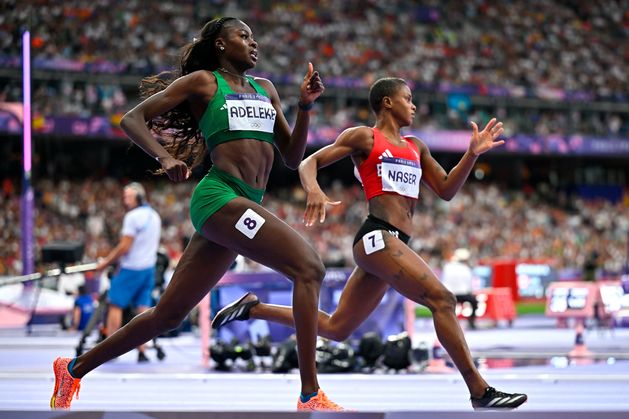The ban in question was installed from June 1, 2024 due to ‘serious anti-doping violations.’
Naser, who won the World 400m title in 2019, previously served a two-year ban in June 2021 after missing three doping tests within a 12-month period.
The 26-year-old set a season best time of 48.53 in the 400m final at the Paris Olympics while Yule won the 3,000m steeplechase in an Olympic record of 8:52.76. Ireland’s Rhasidat Adeleke finished fourth in that 400m final.
Rhasidat Adeleke of Ireland and Salwa Eid Naser of Bahrain in action during the Olympics 400m semi final in Paris
In a statement issued today, World Athletics outlined the background to the case without explaining why Bahraini athletes were not banned from competing in Paris, though they were limited to sending a team of ten.
The case dates back to the Tokyo Olympics. The Athletics Integrity Unit (AIU) issued a notice of charge against the Bahrain Athletics Association (BAA) for ‘serious anti-doping rule violations’ and ‘historical breaches of the World Athletics anti-doping rules’ last December.
The AIU did not recommend an outright ban on athletes from Bahrain.
Instead they were limited to entering a maximum of ten athletes in Paris and at next year’s World championships in Tokyo.
The BAA agreed to spend up to $7.3m over four years to address the doping and integrity risk in athletics in Bahrain.
A ban was imposed on Bahrain from competing in any other World Athletics Series events for 12 months from June 1, 2024.
Their athletes, such as Naser, can continue to run in the Diamond League series as it is not part of the World Series.
The AIU investigation began after it emerged that two Bahraini athletes committed what the statement describes as ‘serious anti-doping violation at the Tokyo Olympics for homologous blood transfusions’ and was also discovered the BAA engaged a ‘coach to work with the national team between 2019 and 2021, who was in fact banned from the sport for anti-doping rule violations’.
The Athletics Integrity Unit is the independent anti-doping unit of World Athletics. It is a separate organisation to the World Anti-Doping Agency (WADA).
The World Athletics Council approved the recommendations made by the AIU in the case, though the statement does not state when the recommendations were approved but presumably it happened before the ban came into effect on June 1.
The BAA will guarantee that an independent and WADA-compliant Bahrain national anti-doping organisation will be established in Bahrain and be fully funded by the Bahrain government until at least the end of 2026.
They will also establish and fund a talent academy to prioritise the development of local talent.
It was also agreed Bahrain will not apply for any transfers of allegiance or recruit any foreign athletes until 2027. The majority of the athletes who compete internationally for Bahrain are born and raised elsewhere.
According to the statement, the AIU board stated that “a satisfactory outcome to the matter has been reached, one which appropriately balances the need for punitive measures to send a strong message, and the goal of creating real change within the federation and within the sport”.
This is cold comfort to the athletes who were beaten by Naser and Yavi at the Olympics in the Stade de France last month.
Furthermore, and though the ban was imposed on June 1, the statement doesn’t explain why the impositions of the sanctions on Bahrain weren’t announced until after the Olympic Games.
So Naser will be in action in Sunday’s Diamond League meeting in Silesia, Poland alongside Marileidy Paulino (Dominican Republic), the gold medallist in Paris, and Poland’s Natalia Kaczmarek, who won bronze.
Irish star Adeleke will also race in Silesia for the first time since finishing fourth in Paris.

